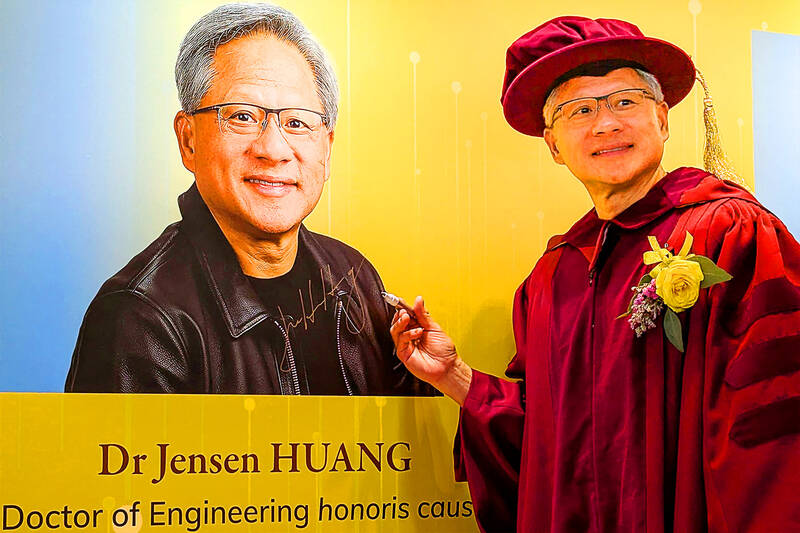Nvidia Corp CEO Jensen Huang (黃仁勳) said on Saturday that global cooperation in technology would continue even if the incoming US administration imposes stricter export controls on advanced computing products.
US president-elect Donald Trump, in his first term in office, imposed restrictions on the sale of US technology to China citing national security — a policy continued under US President Joe Biden. The curbs forced Nvidia, the world’s leading maker of chips used for artificial intelligence (AI) applications, to change its product lineup in China.
The US chipmaking giant last week reported record-high quarterly revenue on the back of strong AI chip demand, though investors are wary of US-China tensions reheating during a new Trump term.

Photo: Holmes CHAN / AFP
“Open science in global collaboration, cooperation across math and science has been around for a very long time. It is the foundation of social advancement and scientific advancement,” Huang said during a visit to Hong Kong.
Cooperation is “going to continue. I don’t know what’s going to happen in the new administration, but whatever happens, we’ll balance simultaneously compliance with laws and policies, continue to advance our technology and support and serve customers all over the world,” he said.
“We’ll continue to do that and we’ll be able to do that just fine,” he added.
The head of the world’s most valuable company was speaking in the financial hub after receiving an honorary doctorate in engineering from the Hong Kong University of Science and Technology.
During the visit, Huang participated in a fireside chat with the university’s council chairman Harry Sham (沈向洋) in front of an audience of students and academics.
Asked about the huge energy requirements of graphics processing units — the chips behind AI — Huang said: “If the world uses more energy to power the AI factories of the world, we are a better world when that happens.”
“The goal of AI is not for training, the goal of AI is for inference,” he said, adding that AI could discover, for instance, new ways to store carbon dioxide in reservoirs, new wind turbine designs and new materials for storing electricity.
People should start thinking about placing AI supercomputers slightly off the power grid and let them use sustainable energy and in places away from populations, he said.
“My hopes and dreams is that in the end, what we all see is that using energy for intelligence is the best use of energy we can imagine,” Huang said.
Earlier on Saturday, Huang told graduates that “the age of AI has started” in a speech after receiving the honorary degree.
“A new computing era that will impact every industry and every field of science,” he said.
The Taiwan-born entrepreneur, 61, also told graduates that he wished he had started his career at this time.
“The whole world is reset. You’re at the starting lines with everybody else. An industry is being reinvented. You now have the instruments, the instruments necessary to advance science in so many different fields,” Huang said.
“The greatest challenges of our time, unimaginable challenges to overcome in the past, all of a sudden seem possible to tackle,” he said.

The Eurovision Song Contest has seen a surge in punter interest at the bookmakers, becoming a major betting event, experts said ahead of last night’s giant glamfest in Basel. “Eurovision has quietly become one of the biggest betting events of the year,” said Tomi Huttunen, senior manager of the Online Computer Finland (OCS) betting and casino platform. Betting sites have long been used to gauge which way voters might be leaning ahead of the world’s biggest televised live music event. However, bookmakers highlight a huge increase in engagement in recent years — and this year in particular. “We’ve already passed 2023’s total activity and

Nvidia Corp CEO Jensen Huang (黃仁勳) today announced that his company has selected "Beitou Shilin" in Taipei for its new Taiwan office, called Nvidia Constellation, putting an end to months of speculation. Industry sources have said that the tech giant has been eyeing the Beitou Shilin Science Park as the site of its new overseas headquarters, and speculated that the new headquarters would be built on two plots of land designated as "T17" and "T18," which span 3.89 hectares in the park. "I think it's time for us to reveal one of the largest products we've ever built," Huang said near the

China yesterday announced anti-dumping duties as high as 74.9 percent on imports of polyoxymethylene (POM) copolymers, a type of engineering plastic, from Taiwan, the US, the EU and Japan. The Chinese Ministry of Commerce’s findings conclude a probe launched in May last year, shortly after the US sharply increased tariffs on Chinese electric vehicles, computer chips and other imports. POM copolymers can partially replace metals such as copper and zinc, and have various applications, including in auto parts, electronics and medical equipment, the Chinese ministry has said. In January, it said initial investigations had determined that dumping was taking place, and implemented preliminary

Intel Corp yesterday reinforced its determination to strengthen its partnerships with Taiwan’s ecosystem partners including original-electronic-manufacturing (OEM) companies such as Hon Hai Precision Industry Co (鴻海精密) and chipmaker United Microelectronics Corp (UMC, 聯電). “Tonight marks a new beginning. We renew our new partnership with Taiwan ecosystem,” Intel new chief executive officer Tan Lip-bu (陳立武) said at a dinner with representatives from the company’s local partners, celebrating the 40th anniversary of the US chip giant’s presence in Taiwan. Tan took the reins at Intel six weeks ago aiming to reform the chipmaker and revive its past glory. This is the first time Tan